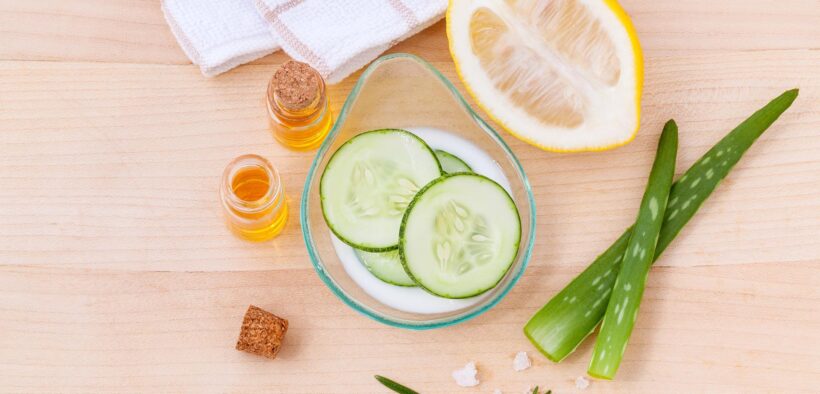Common Skincare Ingredients that Cause Acne Flare-up and Why; Skincare CEO and PharmD Weighs In
Share

By Dr. Liia Ramachandra
It’s time to get out your magnifying glasses and read those skincare product labels. According to research from the University of Notre Dame, many cosmetics and skincare products sold in the United States and Canada likely contain high per- and polyfluoroalkyl substances (PFAS). These are the toxic chemicals linked to several severe health conditions.
The study tested over 200 cosmetics, including foundations, eye, and eyebrow products, as well as various lip products. The results show that 56 percent of foundations and eye products, 48 percent of lip products, and 47 percent of mascaras tested were found to contain high levels of fluorine, which is an indicator of PFAS being used in the product.
When patients come to me, my advice is always: less is better. Because multi-step routines have indoctrinated us, many think that more is better, but less is always better. Having healthy skin and avoiding toxins may take a bit of detective work, but it’s easy and well worth the effort.
Three Tips for a Healthy and Safe Skincare Routine
1. Wash your face
As long as you wash your face every morning and evening, that’s all you need to do.
It doesn’t even need to involve a cleansing product; it can just be water, especially in the morning (unless you wear a lot of heavy masks overnight). Simply wash your face, put on serum cream, and then apply SPF. We can all carve out the two minutes it takes to make this a part of our routine, especially if you have sensitive skin.
2. Be careful of exfoliants and keep it simple.
Many people think they need to exfoliate, which could be an issue. Exfoliants contain harsh chemicals, and if you have sensitive or acne-prone skin, that will make the redness even redder. It will also present a problem for people who have rosacea, psoriasis, or dry skin.
Stay away from fragrances, oils, alcohol, and butters. These ingredients are known to irritate any skin type, especially acne-prone skin. Oils and butters are comedogenic, so they tend to clog pores and form blackheads, which will lead to a flare-up of acne. Skincare products containing alcohol can also dry out and irritate the skin.
3. Moisturize with an SPF
Many people believe that, as long as they apply all these expensive creams, serums, moisturizers, or prescribed treatments on their face — especially if they have acne — that’s all it takes to get healthier skin. I find that most people need one thing; a healthy moisturizer with at least SPF 30.
It doesn’t matter where you live in the world. Whether it’s a cold climate prone to clouds and rain or a warmer one where it’s very sunny, exposure to sunlight is virtually inescapable. Even when it’s cloudy, sunlight is able to bounce off the clouds to reach your face.
The best prevention for dryness and even aging is SPF. My advice is to be as gentle as possible, and that less is more.
Skincare Ingredients to Avoid and the Science Behind the Reaction
We all want to categorize things as “this is good” or “this is bad,” but it’s not so simple. Take retinol, for example. If you don’t presently have, or never have had any skincare issues, you may use retinol or even tolerate the harsh acids they use in facials to eliminate the dead layer of skin.
Due to climate change and other factors, more people today have sensitive skin than in past decades. When you look at some of these product labels, you will often see a lot of lactic, glycolic, or other acids included for exfoliation or acne treatment, but this isn’t always a good thing.
Whether you have a dermatologist or do the research yourself, I always tell my patients that you know your skin better than anyone in the world. You know when it’s dry, and you know when it’s oily. I always advise patients to look at their own skin and choose the right ingredients for their skin type.
People write to me saying, “I am 50 years old, and I have this complexion. When people are over 40, everything changes with their skin, so what should I use?” I follow up and ask many questions like, “Do you have any kind of allergies?” or “Do you have any kind of autoimmune conditions?”
There are times when I suggest acne products for people who are 50. They say, “but I don’t have acne.” Instead, they may have rosacea, or they have a specific type of skin, and acne products have successfully treated this issue.
It’s difficult to tell people to stay away from specific ingredients because you need to look at your skin and treat each person individually. However, when it comes down to products that contain toxic ingredients, then be sure to stay away from phthalates, parabens, fragrances, and chemical sunscreen ingredients.
One area in which to exercise caution is in the use of sunscreens. A few months ago, the FDA said only natural or mineral sunscreen ingredients such as zinc oxide and titanium dioxide are deemed to be safe. Most sunscreens are made with chemical ingredients such as oxybenzone or other ingredients that have “oxy” in front of the name, and many clinical trials studying these ingredients have since been linked to cancer, infertility, autoimmune conditions, and other health issues once put on the skin.
Natural or mineral sunscreen ingredients act as sun blocks. They sit on top of your skin, and they reflect the light, rather than seeping into your skin. In contrast, chemical sunscreen ingredients go into your skin cells, react with the UV rays, and break the rays down into heat. It’s all happening within your skin cells and gets absorbed into your body. After many years of absorption, you can imagine what happens, and many studies show that it is linked to several different kinds of issues.
Always be sure to check the ingredients in the skincare products that contain sunscreens. SPF is just that — a “sun protection factor.” You can get this protection from natural products such as
zinc oxide and titanium dioxide. When people moisturize with SPF, which we all should, you need to check the ingredients to make sure it doesn’t contain toxic chemicals.
Simplifying Your Skincare Regimen
There are two things to keep in mind to simplify your skincare regime. First, less is more. The fewer steps in your regimen, the better. Wash your face once a day, at least with a gentle cleanser or gentle scrub, and use a serum. Serum is essential because it’s filled with nutrients that can be absorbed into your skin. After this step, put on face cream, which you need to lock the serum in, along with the moisture. In the morning, I always recommend using foundation with SPF, or just SPF. In the evening, wash your face and serum and cream, but just slightly heavier than what you would use in the morning.
Second, when you’re reading a product’s label and see more than 25 ingredients, don’t buy it — you’re just spending money on silicones used to bulk up the product. Effective skincare products should not contain more than 25 ingredients to do the work that’s needed for your skin.
It’s important to be informed about what we put in and on our bodies. Scientific studies are coming out every year, exposing that we’ve been applying toxins to our bodies. The more we learn, the more critical it is to keep it simple, and keep it clean. As I always say, less is more.

Dr. Liia Ramachandra, Pharm.D., Ph.D. is a serial entrepreneur and healthcare executive. Dr Liia is the Founder and CEO of EpiLynx, a Gluten-Free Skin Care and Cosmetics Brand. She comes with a vast experience in Global Medical Affairs, Global Ethics and Compliance, Clinical Research and Global Publications. She has worked with multiple companies like Takeda Pharmaceuticals Inc, Pfizer, Astellas. Dr. Liia holds a Master’s degree in Pharmacy and Doctorate in Pharmacy from Groningen University, Netherlands and Ph.D. from the University of Utrecht, Netherlands.










